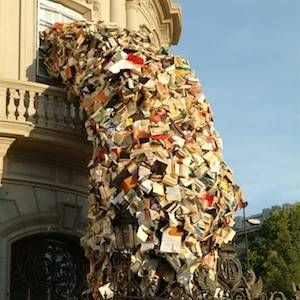
Confessions of a Minimalist With a Book Problem
I did not begin my life as a minimalist by getting rid of everything I owned. After moving a number of times in my early twenties and realizing as a broke grad student that I was going to have to make some tough decisions about how I wanted to spend both my time and money, I slowly started giving things away until I owned little except what really mattered to me.
Minimalists are always accused of being hypocrites, because if you’re talking about removing everything except what is essential, then most of us need almost nothing in the way of material possessions. For me it’s not about how little I own, because you quickly realize that getting rid of all of your stuff won’t solve many of your problems, but rather how I spend my time and what of the things I do own bring meaning to my life.
The one issue I ignored as long as I could was my books.
It was really easy at first to convince myself that my books brought meaning to my life and I should not question whether I really needed to own them. But I wasn’t actually reading that much at the time aside from what was required for school, and so my bookshelf was full of good intentions more than literature that mattered to my life. I settled for not buying anything new, but left my current collection untouched.
Years later when I started reading on my own again, it was time to make some tough decisions. Many minimalists advocate for going all digital, but that provided no solution for what I should do with the books I already owned, and as much as I support ebooks as an idea, I still prefer to read in print. Reading only library books was a better alternative, especially for me since I work in a library, but I like to write in my books–it’s part of the reading experience for me and a way I remember what I have read.
So I mostly continued to ignore the issue, and slowly started buying new books, though I tried to be disciplined about what I added to my collection. And that’s where I was for a very long time until I stopped trying to look for an all-or-nothing solution to my problem with books.
While many of my books were important to me, many of them I was keeping for the wrong reasons. There were books I had purchased for school, and even though they were outside of my subject area, I was keeping them just in case maybe I’d have to teach a class on this subject one day. Books I was no longer interested in, but was keeping because they were expensive. Books that did not reflect my personal interests, but looked very impressive on the shelf. Books I didn’t like, but were so difficult to read that I was keeping them as trophies.
I decided not to keep books just in case, because those feared situations almost never become reality, and if I ever need a book, I can find it at the library (or, worst case scenario, re-purchase it). As for the books I was keeping because I felt guilty for spending money on them, that money was already gone whether I kept the books or not. I realized I don’t read to impress people, so I didn’t need to keep a book just so someone might see it on my shelf and ask me about it; I would much rather talk about the books I love anyway. And I found that it was actually cathartic to give away the books that had nearly defeated me. I only have space on my shelves for the books that mean something to me.
This has been a slow process that sometimes means giving away one book at a time and sometimes means clearing my shelves of boxes of books all at once. When I was home last Christmas, I finally tackled the books I had stored in my parents basement. I had kept every single book I had ever read, and I went through them one-by-one, quickly realizing that while it makes me happy to see I read so much growing up, the actual books had little meaning for me. I don’t need evidence that I read every mystery by Mary Higgins Clark when I was in high school.
I still feel like a minimalist with a book problem. I would like to think I could pick up and travel long-term without wondering what I would do with all of my books, and when I ask myself whether it is really important that I keep them all, the obvious answer is no. As recent as last week, I gave away 102 books from my collection, at least half of them unread. The process made me more excited to look at my shelves and see only my favorites and books that I am genuinely excited to read.














